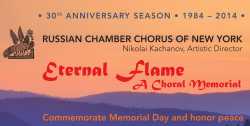 The
Russian Chamber Chorus of New York begins its 30th anniversary year with an
exploration of using music as memorial. "Eternal Flame: A Choral Memorial"
offers both Russian chant and larger modern works, as well as both sacred and
ecumenical approaches. Through these diverse musical perspectives, the concert
commemorates Memorial Day and honors peace.
The
Russian Chamber Chorus of New York begins its 30th anniversary year with an
exploration of using music as memorial. "Eternal Flame: A Choral Memorial"
offers both Russian chant and larger modern works, as well as both sacred and
ecumenical approaches. Through these diverse musical perspectives, the concert
commemorates Memorial Day and honors peace.
The program features selections from the monumental Eternal Memory to the Heroes by Alexander Kastalsky, dedicated to the victims of World War I. The work is intended to embody voices from all nations who lost citizens in the conflict – an ecumenical, inclusive idea of memorialization. To do so, Kastalsky attempted to connect Russian Orthodox tradition with Catholic and Protestant traditions in his composition. Kastalsky’s piece builds tenderly in its last section to a plea for us to never forget those who have sacrificed themselves for others.
The program continues with Tchaikovsky’s Blessed are They, Whom Thou Hast Chosen, which is more traditionally religious in approach – a communion hymn for a memorial liturgy. The work describes the passing of the memory of the dead from generation to generation, and Tchaikovsky brings the work to a stirring climax representing the cry of the world. The program then offers Svyati, by John Tavener. The piece is a personal memorial: as Tavener began sketching the piece, he learned that a dear friend’s father was dying; the piece is dedicated to them. Tavener’s music is also rooted in religious tradition: he converted to Russian Orthodox Christianity in 1977 and has referred to his music as iconographic, representing images of holy figures much in the way that icons are revered in Eastern Orthodoxy. The text he uses is in Church Slavonic, and is familiar to anyone who has attended a Russian Orthodox service. The work captures the back-and-forth dialogue between choir and priest, and Tavener’s cello part is meant to represent the Ikon of Christ; he asks that it be played in the spirit of Eastern Orthodox chant. Kirsten Jerme will join on cello for this work.
Samuel Barber, another Western composer who held an interest in Russian culture, is represented on the program by his elegiac Adagio for Strings, in an arrangement for choir by Nikolai Kachanov. Pieces by Nikolai Golovanov and Yuri Yukechev follow.
The program concludes with Sergei Taneyev’s magisterial cantata, John of Damascus, also known as The Russian Requiem. The choir will be joined by Guy Brewer on organ for this work. Taneyev, a student of Tchaikovsky and teacher of Scriabin and Rachmaninov, builds his cantata around a poem by Alexei Tolstoy capturing some of the philosophical struggles of the great 7th-8th Century theologian and musician, John of Damascus. Taneyev demonstrates his countrapuntal mastery through the work’s dynamic fugue as well as its returning opening theme, based on the traditional Russian Orthodox Church chant “So svyatimi upokoy,” or “Rest with the saints,” a hymn associated with the commemoration of the dead.
Taneyev’s approach is not directly religious, as in that of his teacher, Tchaikovsky. It is a strikingly warm, humanistic take on its subject matter, expressing the notion that those who have left us are not truly gone, as their memory is woven into the fabric of human existence through the love they gave to those around them. The hushed, poignant, a cappella second movement captures this idea in a soaring tenor line: “Even as I sleep, my love does not die.”
The music to be performed in "Eternal Flame: A Choral Memorial" is rich and varied in influence and approach to its subject matter. Several compositions are little performed in the west, especially Kastalsky’s magnum opus of commemoration. The weaving of chant and folk melodies throughout demonstrates how Russian composers root their own creativity in the foundation of village songs and stories. It is through these timeless influences and varied philosophical approaches that audiences will discover how Russian composers have invoked the power of music to remember those gone before.
The Russian Chamber Chorus of New York (www.rccny.org) performs "Eternal Flame: A Choral Memorial” on Saturday, May 31, 3:30 PM at St. Charles Borromeo Church, 1 Aitken Place /19 Sidney Place. Brooklyn; Sunday, June 1, 4:00 PM at Holy Trinity Lutheran Church, 65th Street and Central Park West, Manhattan; and Thursday, June 5, 8:00 PM, at St. Ignatius of Antioch Episcopal Church, 552 West End Avenue (at West 87th Street), Manhattan. Tickets at the door are $25, $15 for students and seniors 65+. For additional information, visit www.rccny.org/ConcertSchedule.html. This program is supported in part by public funds from the New York City Department of Cultural Affairs in partnership with the City Council.
Jason Zahorchak is a tenor enjoying his third season with the Russian Chamber Chorus of New York. He thanks John Pendergast and Anna Laskova, fellow RCCNY singers, for their research on these works.
